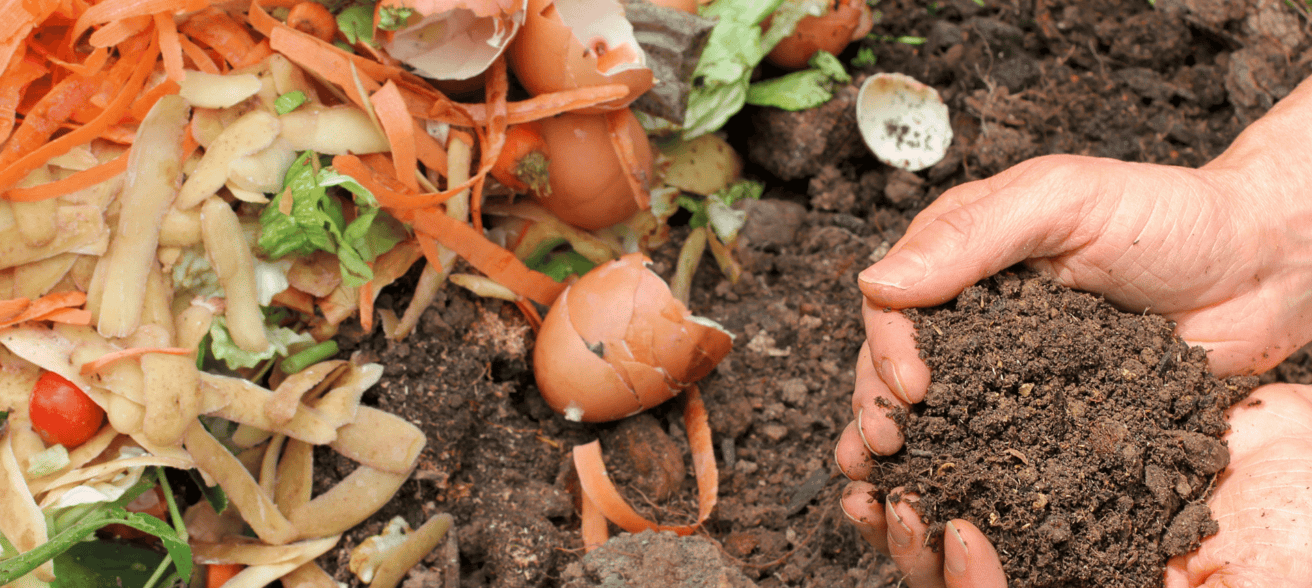The case for composting

Post World War II, landfills were the default way to discard just about everything – food, paper, plastic. You name it. In the 70s, we saw recycling gain popularity as a way to minimize the environmental impact of single-use plastics. Today, we’re seeing a similar movement with composting as a way to mitigate the effects of wasted food. As a food rescue, that’s something we’re excited about, and hope you are too. Composting is a great option for food you can’t consume! Keep reading to learn why it is important and effective, and how you can get started at home.
Wasted food and our planet
Wasted food has a big impact on our planet. Globally, it accounts for 8% of all greenhouse gas emissions, contributing to the climate crisis. Bottom line: Minimizing wasted food is an essential piece of the puzzle to mitigate the effects of climate change.
At Spoonfuls, we believe that, whenever possible, food should fulfill its intended purpose of feeding people. That’s why we rescue and distribute more than 80,000 pounds of excess food every week and encourage people to minimize food waste at home (see the round-up of related reading below). But for food scraps that can’t be consumed, think banana peels and pineapple tops, composting is better for our planet than landfilling.
Composting vs. Landfilling
Food typically breaks down in one of two ways: aerobic (with oxygen) or anaerobic (without oxygen) decomposition. Anaerobic decomposition is what happens when food is sent to a landfill. Here it takes longer to break down and emits methane, a greenhouse gas 25 times more potent than carbon dioxide, making it better at trapping heat inside Earth’s atmosphere.
When food is composted, it undergoes aerobic decomposition, which produces almost no methane and fewer total greenhouse gases. Other benefits include:
- Soil by-product: When food has finished going through the composting process, it leaves behind nutrient-rich soil, which can be used to grow new food.
- Less reliant fertilizers: Many growers rely on synthetic fertilizers to put necessary nutrients for growing food into the soil. These harmful chemicals are bad for farm workers’ health and result in runoff that pollutes local waterways. Instead, compost can be used as it contains the same key nutrients: nitrogen, phosphorus, and potassium.
- Water retention: Healthy soil (made with compost) holds more water, which means less can be used to grow food. This is especially important as we see droughts and floods worsen due to the effects of global warming. Using less water to grow food can help preserve the natural resource, which is especially important during drought conditions. When heavy rain falls, healthy soil can mitigate flood conditions because it can absorb more water that would otherwise sit on top of the ground.
- Takes up less space: Landfills, like those in Massachusetts, are running out of space. Municipal composting can drastically reduce landfill inputs, making us less reliant on other states to take our trash.
For more reading on the benefits of composting, check out this article by the NRDC.
So how do I compost?
Check with your town
Municipal-run, or funded, compost programs are rising in popularity as communities look to take collective action against the climate emergency. The trash and recycling section of your town’s website is likely the place to start. Boston, Natick, and Worcester are all examples of towns that offer curbside or drop-off composting for free to their residents.
Many other towns, like Longmeadow, offer low-cost compost bins for residents interested in managing their own compost.
If your town isn’t offering a compost program yet, or you’d like to see them expand on their existing one, ask them to! As a resident of your town, you have the power to advocate for these programs. Shoot your town officials an email, or even better, speak up at your next town hall meeting.
Do it yourself
For those without town composting programs or who enjoy DIY projects, there are ways to approach composting to fit into any lifestyle. Apartment dwellers included! Check out this NPR Life Kit article for some ideas.
Use a compost service
For those who prefer not to manage their own compost pile, but whose towns don’t have an existing program, you might consider a curbside compost program. These operate similarly to curbside trash and recycling programs, except they are managed by privately-owned companies. At Spoonfuls’ office, we set aside our food scraps for collection by Black Earth Compost. Other common compost services in Massachusetts include Bootstrap Compost, City Compost, The Compost Cooperative, and Garbage to Garden. Pick the one that’s best for you.
Happy composting!
Don’t forget that while compost is a great place for food scraps, minimizing the amount of food waste you generate is important, too. The link below has some resources to help with that.